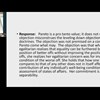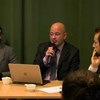revisor
Belief Revision for Growing Awareness
Mind 130(520), 2021 Abstract The Bayesian maxim for rational learning could be described asconservative changefrom one probabilistic belief orcredencefunction to another in response to new information. ). But can this conservative-change maxim be extended to revising one’s credences in response to entertaining propositions or concepts of which one was previously unaware? The economists,) make a proposal in this spirit. Philosophers have adopted effectively the same rule: revision in response to growing awareness should not affect the relative probabilities of propositions in one’s ‘old’ epistemic state. The rule is compelling, but only under the assumptions that its advocates introduce. It is not a general requirement of rationality, or so we argue. We provide informal counterexamples. And we show that, when awareness grows, the boundary between one’s ‘old’ and ‘new’ epistemic commitments is blurred. Accordingly, there is no general notion of conservative change in this setting.
Expert deference as a belief revision schema
in Synthese (2020) AbstractWhen an agent learns of an expert’s credence in a proposition about which they are an expert, the agent should defer to the expert and adopt that credence as their own. This
Neopatrimonialism and the political economy of Economic Performance in Africa: Critical Reflections
Institute for Futures Studies Working Paper 2013:1. A revised version is published in World Politics, 1-50, 2015.
Making their Mark. Disentangling the Effects of Neighbourhood and School Environment on Educational Achievement
Working Paper 2007 No. 3 A revised version is published in the European Sociological Review, 24 (4). Lars Brännström

Richard Arneson: Should we reward the deserving? Some puzzles
Do plausible fundamental principles of justice incorporate the idea of rewarding the deserving? Utilitarianism is famously indifferent between a world in which saints fare badly and scoundrels fare we
A Duty to Resist: When Disobedience Should be Uncivil
Mind Abstract Candice Delmas’ A Duty to Resist arrives, fittingly, in a world of increasing authoritarianism, and the caged children and burning forests left in its wake. Widely diagnosed as a failure t

Beyond Operation Protective Edge
This is a seminar on international law and war ethics, taking Operation Protective Edge as an example. The seminar was held at the Institute for Futures Studies in Stockholm 2015. Participants: He
Richard Arneson: Should we reward the deserving? Some puzzles
Richard Arneson is a political philosopher with a special interest in theories of social justice. AbstractDo plausible fundamental principles of justice incorporate the idea of rewarding the deserving?
Sufficiency and the Distribution of Burdens
In: Mosquera, J. & O. Torpman (ed.), Studies on Climate Ethics and Future Generationsvol. 6. Working Paper Series 2024:10–17 Abstract A common objection to sufficientarianism is that it allows large

Anders Ekholm
I have had the position as vice president and advisor at the Institute for Futures Studies and before that I worked as head of analysis at the Ministry of Social Affairs, with research concerning our








